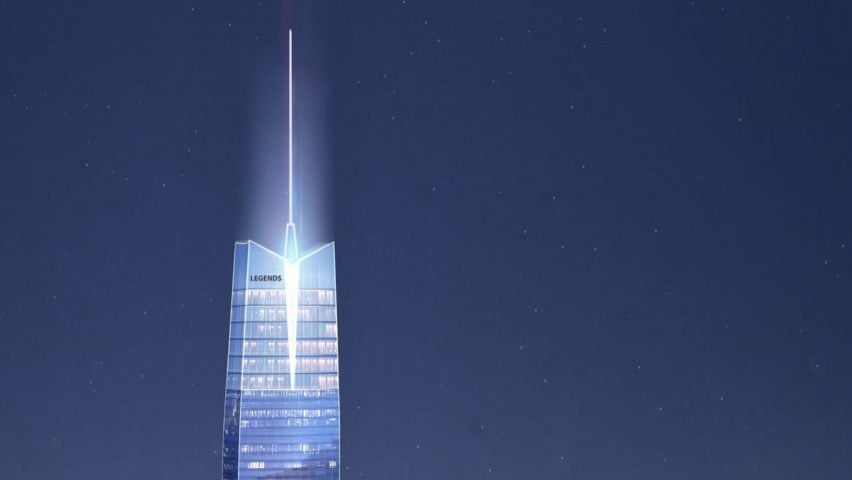
"Legends Tower is a very 20th-century way to say that you are squarely entering the 21st century"
Recently unveiled proposals to build America's tallest skyscraper in Oklahoma City represent an outdated way of thinking about cities' cultural status, writes Ryan Scavnicky.
The 20th-century American metropolis is failing in the 21st. Cities that once welcomed flocks of working-class citizens and immigrants are now playgrounds for wealthy oligarchs and real-estate moguls. Streets covered in unique family businesses from all parts of the world are now thickly encrusted with contrived food experiences and milquetoast fusion concepts (the recent loss of Suehiro in Los Angeles to a marijuana dispensary comes to mind).
The United States' largest cities have all but completely priced out middle-class life. A new study by the Harvard Joint Center for Housing Studies found that the number of "cost-burdened" renting households – people who spend more than 30 percent of their income on housing – hit a record 22.4 million in 2022, up 2 million from just three years before. Meaning half of all renters struggle to afford rent. We desperately need more affordable housing, and our largest cities are seemingly incapable of keeping up.
The plan has critics and neophytes alike scratching their heads
Enter the planned Boardwalk at Bricktown development in plucky Oklahoma City (OKC), which recently hit the headlines after the site's owners unveiled shocking plans to include the tallest building in the United States. In addition to a hotel and almost 2,000 residential units, the development includes Legends Tower, a 581-metre-tall high rise poised to become the fifth-tallest in the world.
The plan has critics and neophytes alike scratching their heads, and rightly so. Why in the world is this a good idea for Oklahoma City, a place certainly not in desperate need of a new skyscraper? And, hey, what about tornadoes? Searching for answers leads beyond the particulars of the design to find crucial insight into the state of the American metropolis.
First, the architecture offers little design merit. The tower itself is handsome; it has clean vertical edges with a slight taper towards the top, completed by a soaring antenna spire. But beyond that, a proposed podium mall is a jarring collision of materials under a flowing canopy which neither matches nor compliments the anchoring fountain.
I generally like quirky discordant mall urbanism, and this isn't that – it's a spineless copy of Galaxy Soho in Beijing. The middle towers have connecting banded walkways and vertical openings which introduce further visual themes into the already overwrought composition.
Nevertheless, some cities in Middle America are adding housing directly to the central business districts with success, like Austin, Cleveland, and Columbus. And while Legends Tower is unnecessarily tall, the surrounding towers, public space, community and affordable housing, and overall connectedness to the surrounding central business district are promising.
The project connects a river walk and the downtown core by filling a currently empty surface parking lot. It is near a streetcar and an Amtrak station with trains to Dallas, Austin, and San Antonio. It also offers some public space, but keep in mind the Boardwalk at Bricktown development isn't truly public, it's what I like to call "mall cop" space, meaning it will be vaguely policed, and have its own set of rules it can enforce, like Hudson Yards in New York City.
The proposal for Legends Tower sends the wrong message
Mid-size cities like OKC are in a better position than ever before to create an attractive environment for those who are either priced out or burned out of life in yesterday's metropolis. As the world changes after a global pandemic and rise of remote work, the cultural benefits of living directly in a major core are wearing thin. No wonder major cities have not yet rebounded from population loss during 2020 and 2021.
Yet, the proposal for Legends Tower sends the wrong message. The 20th-century American metropolis is the physical manifestation of the inequalities of the capitalist economy – most represented by the proximity of poverty to soaring office towers – all wrapped in the paradoxical and often dystopian promise of ever-expanding growth. Before mass media changed cultural production, the prevailing notion was that the city with the tallest tower must have the most cultural and economic importance.
Clearly, Legends Tower is trying to do just that. But realistically it would be silly to think a tall tower in and of itself will push OKC to cultural prevalence in the 21st century, or convince anyone to move there from LA.
This means Legends Tower is a very 20th-century way to say that you are squarely entering the 21st century of cultural and economic change. Instead, Oklahoma City might do better to chop the single tower into five sections and place them in the immediate vicinity. It could establish a wide grassroots buy-in to small, dense and affordable revitalization projects along established transit corridors. Culture comes with that.
Hopefully the Boardwalk at Bricktown development reinforces interest in adding density to the region, which has grown since 2022 zoning legislation legalized accessory dwelling units and four-plex duplexes in single-family residential sections. OKC needs a new icon, and Legends Tower is at the very least a symbol that confirms mid-size cities have the nerve to imagine a physical and cultural resurgence amidst the stagnation of the 20th-century American metropolis.
Oh, and don't worry about tornadoes. We have building codes for a reason.
Ryan Scavnicky is an architect, educator and critic. He is an assistant professor at the School of Architecture at Marywood University and the founder of architecture-related media practice Extra Office.
The image is courtesy of AO.
Dezeen In Depth
If you enjoy reading Dezeen's interviews, opinions and features, subscribe to Dezeen In Depth. Sent on the last Friday of each month, this newsletter provides a single place to read about the design and architecture stories behind the headlines.